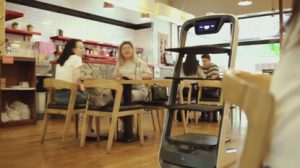According to the latest statement, Australia-Recently, a famous Korean BBQ restaurant on Elizabeth Street in the CBD of Melbourne, Australia, took in a new member to deliver food in the store. That is PuduBot, the iconic delivery robot from Pudu Robotics.
PuduBot has been well received by the locals since its introduction in the restaurant. While waiting for the food to be served, many customers use their mobile phones to take photos or videos of PuduBot hustling and bustling around.
Robot waiters are nothing new in the modern world, but people may wonder “How does the robot deliver food to the designated location? How does it avoid people coming and going? Is it reliable? And how can it ensure the food is not spilled or dropped?”
Well, it’s all a piece of cake for PuduBot!
PuduBot is developed by Pudu Robotics, a world-leading provider of commercial robots. Pudu has developed over 400 patents, more than 60% of which are utility patents. Relying on the core technologies of low-speed autonomous driving, robotics motor, and motion control, Pudu has launched top-notch delivery and disinfection robots to the market.
As we know, Pudu’s delivery robot features automatic driving, positioning and navigation, and obstacle avoidance. So how does this work? It is made possible by the multi-sensor PUDU SLAM algorithm independently developed by Pudu. This cutting-edge technology integrates the data from the vision camera, lidar, RGBD camera, IMU, encoder, ultrasonic sensor and many more sensors, enabling centimeter-level map construction and positioning with high precision and robustness.
During its movement, the robot processes data from sensors through the perception algorithm, accurately identifies obstacles in the environment, and generates a high-precision, multi-layer semantic map. It also makes local path planning to fine-tune the trajectory in real time while maintaining the general direction of the global path, allowing for flexible obstacle avoidance.
Today, Pudu’s delivery robots have been sold to 50+ countries in the world. They have found wide applications in restaurants, hospitals, supermarkets, and even airports and office buildings of all sizes, providing flexible delivery that users can rely on.

